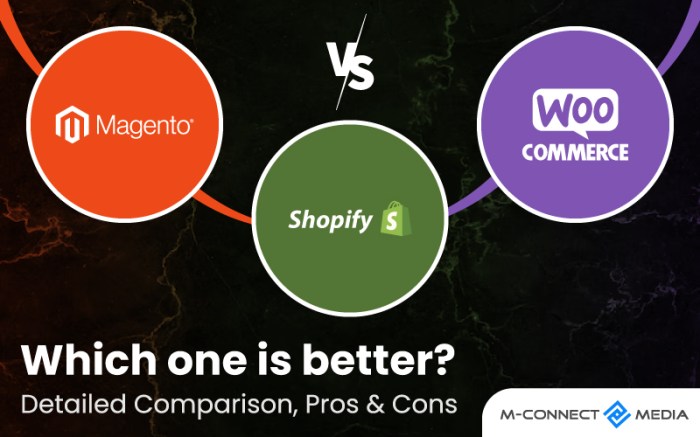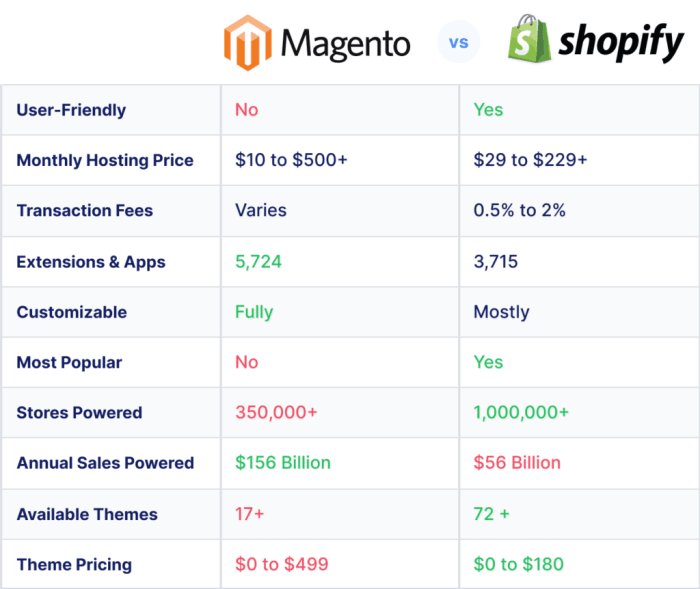Magento vs. Shopify: Which Platform Has Better SEO?
When it comes to optimizing your online store for search engines, Magento and Shopify stand out as popular e-commerce platforms. Delving into Magento vs. Shopify: Which Platform Has Better ?, we explore the key features, pricing structures, and capabilities of each platform to help you make an informed decision for your business.
Overview of Magento and Shopify
Magento and Shopify are two popular e-commerce platforms that cater to businesses looking to set up online stores. Each platform has its own set of features, target users, and pricing structures.
Key Features of Magento and Shopify
- Magento: Known for its flexibility and scalability, Magento offers a wide range of customization options for businesses of all sizes. It provides advanced capabilities, multi-store management, and a large community of developers for support.
- Shopify: Shopify is user-friendly and easy to set up, making it ideal for beginners. It offers built-in tools for marketing, order management, and inventory tracking. While it may not be as customizable as Magento, it is a great option for small to medium-sized businesses.
Target Users of Magento and Shopify
- Magento: Targeted towards businesses that require a high level of customization and have the resources to manage a more complex platform. It is suitable for medium to large enterprises looking for a scalable solution.
- Shopify: Geared towards small to medium-sized businesses and entrepreneurs who want a user-friendly platform that is easy to manage without technical expertise. It is also popular among businesses that prioritize quick setup and ease of use.
Pricing Structures of Magento and Shopify
- Magento: Magento is an open-source platform, which means the software itself is free to use. However, businesses will incur costs for hosting, development, and maintenance. The total cost can vary depending on the level of customization and features required.
- Shopify: Shopify offers tiered pricing plans starting from a basic package to advanced options with more features. The monthly subscription fees cover hosting, security, and support, making it easier for businesses to budget their expenses.
capabilities of Magento
Magento is known for its robust capabilities, offering a wide range of built-in features and functionalities to help improve the visibility of online stores in search engine results. From customizable URLs to meta tags, Magento provides various tools to optimize the website for search engines.
Built-in features of Magento
- Customizable URLs: Magento allows users to create -friendly URLs that are easy for search engines to crawl and index.
- Meta tags optimization: Users can easily add meta titles, descriptions, and s to their products and pages to improve search engine visibility.
- XML sitemap generation: Magento automatically generates XML sitemaps, making it easier for search engines to discover and index website content.
- Canonical tags: Magento supports canonical tags to prevent duplicate content issues and consolidate link equity.
- Schema markup: Magento offers support for Schema.org markup, helping search engines better understand the content of web pages.
Magento’s mobile optimization
Magento is designed to be mobile-responsive, ensuring that online stores perform well on mobile devices. This is crucial for , as search engines prioritize mobile-friendly websites in their rankings. By providing a seamless user experience on mobile, Magento helps improve search engine visibility and rankings.
extensions available for Magento
- Yoast for Magento 2: This extension provides advanced features such as content analysis, XML sitemap generation, and meta tag optimization.
- MageWorx Suite Ultimate: With features like rich snippets, breadcrumbs, and reports, this extension enhances the capabilities of Magento websites.
- Toolkit by Amasty: This extension offers optimization tools like metadata templates, hreflang tags, and redirect manager to improve website rankings.
capabilities of Shopify
When it comes to capabilities, Shopify offers a range of tools and features to help improve the search engine rankings of your online store.
tools and features offered by Shopify
- Integrated Blogging Platform: Shopify includes a built-in blogging platform, allowing you to create -friendly content to drive organic traffic to your site.
- Meta Tags and Descriptions: You can easily customize meta tags and descriptions for products, collections, and pages to optimize them for search engines.
- Mobile Optimization: Shopify themes are mobile-responsive, ensuring that your site is optimized for mobile devices, which can positively impact your rankings.
- 301 Redirects: You can set up 301 redirects to maintain value when changing URLs or restructuring your site.
Comparison of customization options
- Shopify offers a user-friendly interface that makes it easy to customize elements such as meta tags, URLs, and alt text for images without needing technical expertise.
- While Magento provides more advanced customization options for experienced users, Shopify's simplicity can be advantageous for beginners looking to improve their site's .
URL structures for in Shopify
Shopify automatically generates -friendly URLs based on the product or page title, eliminating the need for manual URL optimization. Additionally, Shopify allows you to customize URLs to include relevant s, enhancing performance.
Performance comparison for

When it comes to , performance plays a crucial role in determining the success of a website in search engine rankings. Let's compare the performance metrics of Magento and Shopify to see how they impact .
Page Speed and Loading Times on Magento for
- Magento is known for being a robust platform with extensive customization options, but this can sometimes lead to slower page speed and longer loading times.
- The complex architecture of Magento can result in a heavier website, which may affect the loading speed, impacting rankings.
- Optimizing images, reducing server response time, and enabling browser caching are essential steps to improve page speed on Magento for better performance.
Performance Metrics of Shopify for
- Shopify, on the other hand, is known for its simplicity and ease of use, which can contribute to faster page speed and shorter loading times compared to Magento.
- The streamlined nature of Shopify's platform makes it easier to optimize for performance, leading to better rankings.
- Shopify also offers built-in features like automatic image optimization and content delivery network (CDN) integration to enhance performance and .
Impact of Performance on Rankings for Both Platforms
- Google considers page speed as a ranking factor, so faster loading times can positively impact rankings for both Magento and Shopify websites.
- Websites with slower loading times may experience higher bounce rates and lower user engagement, which can negatively affect performance on both platforms.
- Regular performance monitoring, optimization, and maintenance are crucial for improving rankings on Magento and Shopify, ensuring a positive user experience and higher search engine visibility.
Content management for
When it comes to managing content for purposes, both Magento and Shopify offer various features to help improve search engine rankings. Let's delve into the specifics of each platform.
Magento’s content management capabilities for
Magento provides a robust content management system that allows users to create -friendly content. Some key features include:
- Customizable URL structures for pages and products
- Meta tags customization for individual pages
- XML sitemap generation for easy indexing by search engines
- Ability to create -friendly URLs and optimize images for better search visibility
Shopify’s -friendly content management
Shopify also offers a user-friendly interface for managing content with a focus on . Here are some features that make it -friendly:
- Automatic generation of sitemaps for easy indexing
- Customizable meta tags for products and pages
- Ability to create -friendly URLs and optimize images
- Integration with apps for additional optimization capabilities
Effectiveness of content marketing strategies on Magento and Shopify
Both Magento and Shopify allow users to implement effective content marketing strategies to improve . However, the effectiveness of these strategies may vary based on the specific needs and goals of the business. Some factors to consider include:
- Magento's flexibility allows for more advanced content marketing strategies tailored to specific goals
- Shopify's user-friendly interface makes it easier for beginners to implement basic practices effectively
- Integration of third-party tools and apps can further enhance content marketing efforts on both platforms
- Regularly updating and optimizing content is crucial for maintaining rankings on both Magento and Shopify
Summary

As we conclude our comparison between Magento and Shopify in the realm of , it becomes evident that both platforms offer unique strengths for enhancing your online visibility. Whether you lean towards Magento's robust features or Shopify's user-friendly customization options, optimizing your website for search engines is essential for driving organic traffic and boosting your online presence.
Top FAQs
Which platform is more cost-effective for : Magento or Shopify?
Shopify tends to be more cost-effective for smaller businesses with simpler needs, while Magento offers more advanced features suited for larger enterprises looking for extensive customization.
Can Shopify handle large-scale e-commerce websites for purposes?
Yes, Shopify can effectively manage large-scale e-commerce websites and provide robust tools to optimize your online store's visibility.
Does Magento have better mobile optimization compared to Shopify?
Magento is known for its strong mobile optimization capabilities, allowing your online store to rank well in mobile search results and cater to the growing mobile user base.




